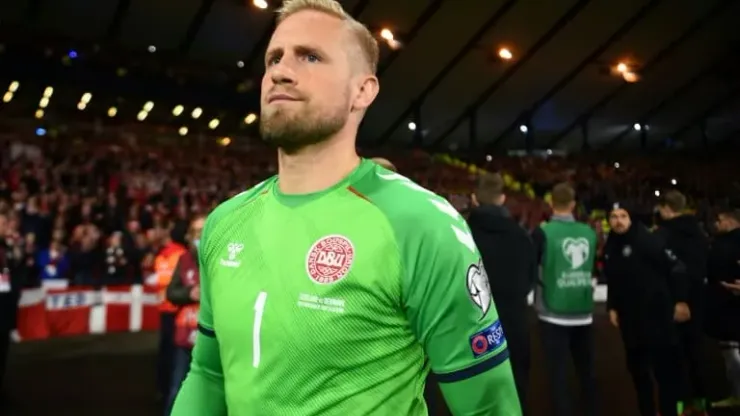Copenhagen (AFP) – Vehemently opposed to Qatar’s hosting of the 2022 World Cup, football federations in the Nordic countries are putting pressure on Doha and FIFA to improve conditions for migrant workers in the emirate.
Together with rights organisation Amnesty International, the federations of Sweden, Norway, Denmark, Finland and Iceland have ratcheted up the pressure in recent months, raising their concerns and presenting recommendations in letters, meetings with officials and pre-game protests.
“We are against holding the World Cup in Qatar, we thought it was a bad decision,” the head of the Danish federation DBU, Jakob Jensen, told AFP.
“It is wrong in many ways. Because of the human rights situation, the environment, building new stadiums in a country with very little stadium capacity,” he said.
Denmark are the only Nordic country to have qualified for the tournament so far. Sweden face a playoff next year to secure a place and Norway, Finland and Iceland have been eliminated.
Leading the charge, the Danish federation regularly publishes the Nordic countries’ letters sent to FIFA and holds talks with Qatari officials, including an October meeting with Qatar head organiser Hassan Al-Thawadi.
The main concern is migrant workers’ rights.
Qatar has faced criticism for its treatment of migrant workers, many of whom are involved in the construction of the World Cup stadiums and infrastructure.
Campaigners accuse employers of exploitation and forcing labourers to work in dangerous conditions.
Qatari authorities meanwhile insist they have done more than any country in the region to improve worker welfare, and reject international media reports about thousands of workers’ deaths.
– ‘Hold organisers responsible’ –
The Nordics have also raised other concerns with al-Thawadi, Jensen said.
“Will homosexuals be allowed to attend the World Cup? Will men and women be able to attend the matches together? Will the press have free access to all sorts of issues to do investigations in the country?”
“And all the answers we received were ‘yes’. So of course we’re going to hold him responsible for that,” Jensen said.
The Danish federation said its World Cup participation would focus on the games played on the pitch, and it will not do anything to promote the event for organisers.
It will limit the number of trips it makes to Qatar, the team’s commercial partners will not take part in official activities there, and its two jersey sponsors will allow training kit to carry critical messages.
In Norway, whose qualification bid fell apart when its best player Erling Braut Haaland missed games through injury, the issue culminated in June when its federation held a vote on whether to boycott the World Cup.
Delegates ultimately voted against the idea, but an expert committee recommended 26 measures, including the creation of a resource centre for migrant workers and an alert system to detect human rights violations and inform the international community.
Like other teams, Norway’s squad also protested before each match by wearing jerseys or holding banners like the one unfurled during a recent match against Turkey, reading “Fair play for migrant workers”.
– Inconsistencies –
But the Nordic countries have not always acted in line with their own campaign.
Last month at a Copenhagen stadium, a Danish fan was ordered to take down his banner criticising the World Cup in Qatar, as FIFA rules prohibit political statements.
And Sweden’s federation recently scratched plans to hold its winter training camp in the emirate as it has done the past two years.
Sweden’s professional clubs had protested against the hypocrisy of holding the camp there while at the same the federation was leading the protests with Nordic counterparts.
The professional clubs wanted to send a “signal”, the chairman of Swedish Professional Football Leagues, Jens Andersson, told AFP.
Individual players have also spoken out.
Finland’s captain Tim Sparv last week issued a joint appeal with Amnesty demanding that “FIFA must ensure that human rights are respected”, adding: “We are in debt to those people who have worked for years in poor conditions.”
So far, none of FIFA’s 200 other member federations have joined the Nordic campaign.
“Hopefully all these Nordic neighbours of ours and us taking these steps will have an impact on other countries,” Mats Enquist, secretary general of the Swedish Professional Football League, told AFP.
“We need to ensure that all the aspects of football, not just the richest, are really taken care of when we come to a place.”
200+ Channels With Sports & News
- Starting price: $33/mo. for fubo Latino Package
- Watch Premier League, Women’s World Cup, Euro 2024 & Gold Cup
The New Home of MLS
- Price: $14.99/mo. for MLS Season Pass
- Watch every MLS game including playoffs & Leagues Cup
Many Sports & ESPN Originals
- Price: $10.99/mo. (or get ESPN+, Hulu & Disney+ for $14.99/mo.)
- Features Bundesliga, LaLiga, Championship, & FA Cup
2,000+ soccer games per year
- Price: $5.99/mo
- Features Champions League, Serie A, Europa League & Brasileirāo
175 Premier League Games & PL TV
- Starting price: $5.99/mo. for Peacock Premium
- Watch 175 exclusive EPL games per season






